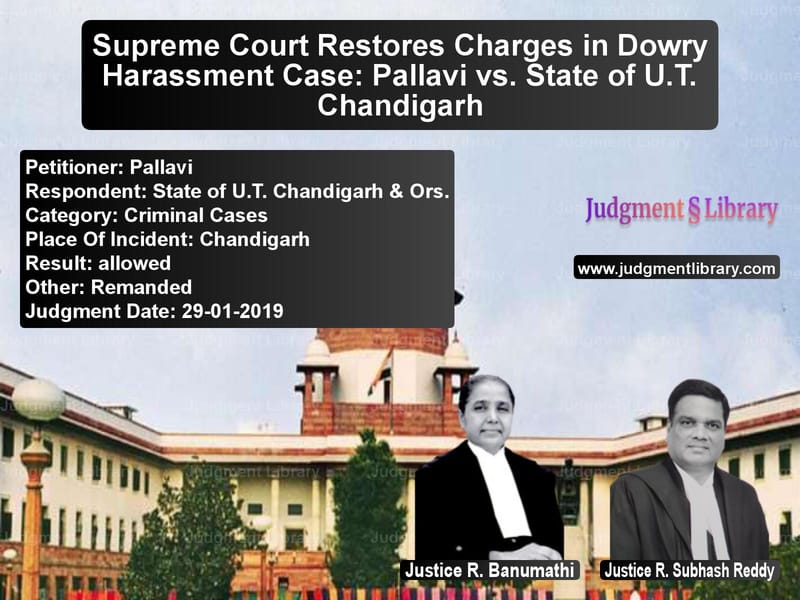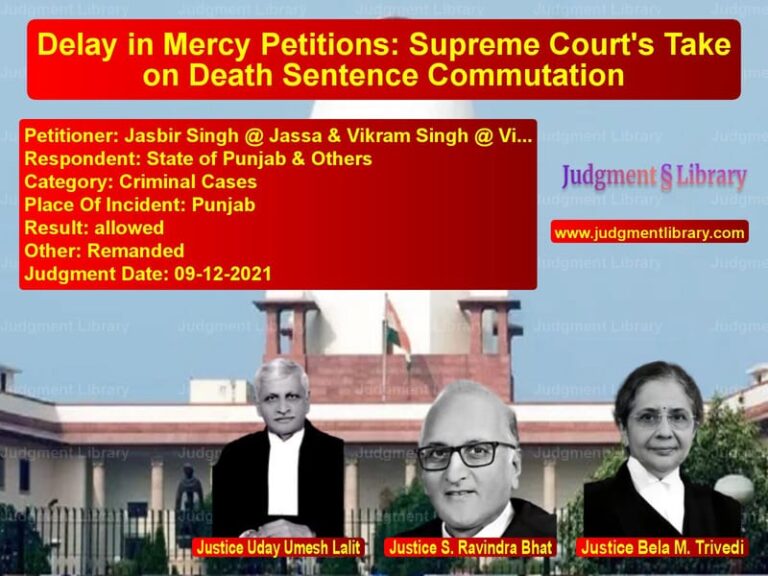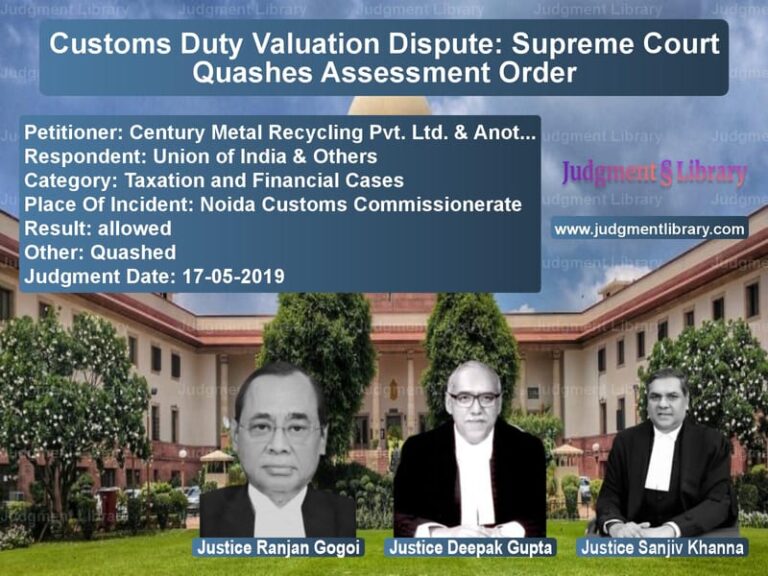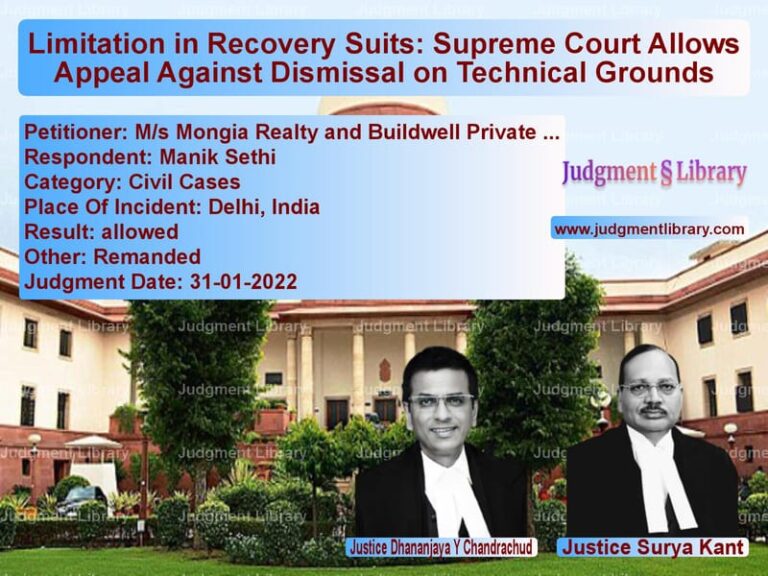Supreme Court Restores Charges in Dowry Harassment Case: Pallavi vs. State of U.T. Chandigarh
The Supreme Court of India recently ruled in Pallavi vs. State of U.T. Chandigarh & Ors., reinstating charges under Sections 406 and 498A of the Indian Penal Code (IPC) against the appellant’s mother-in-law and sister-in-law. The Court reversed the decisions of the Punjab and Haryana High Court and the Sessions Court, which had quashed the charges on the grounds of insufficient evidence.
The judgment underscores that at the framing of charges stage, the Trial Court only needs to assess whether there is prima facie material to proceed with the case. It also clarifies that revisional courts should not delve into the merits of the prosecution’s evidence at such an initial stage.
Background of the Case
The appellant, Pallavi, was married to Rajesh Kumar in a love marriage on February 27, 2009. Initially, they lived separately from his family. However, with the family’s consent, their marriage was solemnized again on September 22, 2010. A son was born from the wedlock on December 5, 2010.
According to Pallavi, at the time of her second marriage, she was given gold ornaments and household articles. However, she alleged that once she moved in with her in-laws, she faced harassment from her mother-in-law Kamla Devi and sister-in-law Jethani (Respondents No. 2 and 3). The harassment allegedly included demands for dowry and gold ornaments.
Additionally, Pallavi accused them of coercing her family into transferring a booth shop owned by her father, which was later transferred to her husband’s sisters. Following continuous harassment, she filed a complaint with the Senior Superintendent of Police (SSP), Chandigarh, leading to the registration of an FIR No. 91 dated March 15, 2014.
After the investigation, a chargesheet was filed against her husband, mother-in-law, and sister-in-law, and on May 11, 2015, the Trial Court framed charges against them under Sections 406 (criminal breach of trust) and 498A (cruelty for dowry).
Sessions Court and High Court Rulings
Respondents No. 2 and 3 challenged the framing of charges before the Sessions Court. On October 15, 2015, the Sessions Court quashed the charges against them, citing:
- There was no specific allegation against the mother-in-law and sister-in-law regarding harassment for dowry.
- A newspaper article dated February 25, 2009 showed that the mother-in-law had disowned her son even before the marriage.
- Since it was a love marriage, there was less likelihood of dowry demands.
Pallavi appealed against the decision before the Punjab and Haryana High Court, which affirmed the Sessions Court’s ruling on September 12, 2018, leading her to approach the Supreme Court.
Key Legal Issues
- Whether the Trial Court was justified in framing charges based on the available evidence.
- Whether the Sessions Court and High Court erred in quashing charges despite prima facie materials.
- Whether revisional courts have the authority to interfere with the Trial Court’s decision at the charge-framing stage.
Arguments by the Appellant (Pallavi)
- The Trial Court had correctly framed charges based on the prima facie evidence in the chargesheet.
- The Sessions Court and High Court erred in evaluating the merits of the evidence at such an early stage.
- The newspaper report relied upon by the Sessions Court was irrelevant as the alleged harassment occurred much later.
Arguments by the Respondents (Kamla Devi & Jethani)
- There were no direct allegations of dowry harassment against them.
- The alleged acts of cruelty were not supported by substantial evidence.
- Since the mother-in-law had disowned her son in 2009, she could not have been involved in dowry harassment.
Supreme Court’s Observations
The Supreme Court, comprising Justice R. Banumathi and Justice R. Subhash Reddy, ruled in favor of the appellant, restoring the charges.
The Court emphasized:
- “At the stage of framing of charge, the Trial Court is only required to assess whether there are prima facie materials indicating the commission of an offense.”
- “The revisional jurisdiction should not be used to reassess evidence or consider the sufficiency of materials for conviction.”
- “The presence of some supporting materials in the chargesheet is sufficient to frame charges.”
Final Verdict
The Supreme Court set aside the High Court’s judgment and ruled:
- The order of framing charges by the Trial Court was restored.
- The Sessions Court and High Court erred in interfering with the framing of charges.
- The case was remanded to the Trial Court for further proceedings.
Legal and Social Implications
- The judgment reinforces that courts should not scrutinize evidence at the charge-framing stage.
- It strengthens legal protections for dowry harassment victims by ensuring that cases proceed to trial if prima facie evidence exists.
- The ruling discourages premature quashing of charges, ensuring that accused individuals face trial where sufficient allegations exist.
This case highlights the Supreme Court’s commitment to ensuring that dowry harassment cases are not dismissed prematurely, safeguarding victims’ rights to a fair trial.
Petitioner Name: Pallavi.Respondent Name: State of U.T. Chandigarh & Ors..Judgment By: Justice R. Banumathi, Justice R. Subhash Reddy.Place Of Incident: Chandigarh.Judgment Date: 29-01-2019.
Don’t miss out on the full details! Download the complete judgment in PDF format below and gain valuable insights instantly!
Download Judgment: Pallavi vs State of U.T. Chandi Supreme Court of India Judgment Dated 29-01-2019.pdf
Direct Downlaod Judgment: Direct downlaod this Judgment
See all petitions in Dowry Cases
See all petitions in Domestic Violence
See all petitions in Alimony and Maintenance
See all petitions in Judgment by R. Banumathi
See all petitions in Judgment by R. Subhash Reddy
See all petitions in allowed
See all petitions in Remanded
See all petitions in supreme court of India judgments January 2019
See all petitions in 2019 judgments
See all posts in Criminal Cases Category
See all allowed petitions in Criminal Cases Category
See all Dismissed petitions in Criminal Cases Category
See all partially allowed petitions in Criminal Cases Category







